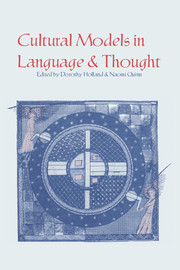Book contents
- Frontmatter
- Contents
- Preface
- List of Contributors
- Introduction
- Part I Presupposed worlds, language, and discourse
- Part II Reasoning and problem solving from presupposed worlds
- 6 Proverbs and cultural models
- 7 Convergent evidence for a cultural model of American marriage
- Part III The role of metaphor and analogy in representing knowledge of presupposed worlds
- Part IV Negotiating social and psychological realities
- Part V An appraisal
- Index
6 - Proverbs and cultural models
An American psychology of problem solving
Published online by Cambridge University Press: 05 June 2012
- Frontmatter
- Contents
- Preface
- List of Contributors
- Introduction
- Part I Presupposed worlds, language, and discourse
- Part II Reasoning and problem solving from presupposed worlds
- 6 Proverbs and cultural models
- 7 Convergent evidence for a cultural model of American marriage
- Part III The role of metaphor and analogy in representing knowledge of presupposed worlds
- Part IV Negotiating social and psychological realities
- Part V An appraisal
- Index
Summary
Proverbs are generally regarded as repositories of folk wisdom. As stylized sayings that presume to represent the commonsensical in everyday life, they are a topic of special interest for this volume's focus on cultural models. The dictionary defines a proverb as “a short, pithy saying in frequent and widespread use, expressing a well-known truth or fact.” Attention to just what “well-known truths” are, in fact, expressed by proverbs and how, cognitively and linguistically, they obtain their particular brand of meaning may provide some insight into the organization of cultural models that underlie them.
Proverbs are especially interesting because, like much of ordinary language, they accomplish both conceptual and pragmatic work (see Briggs 1985). On the one hand, proverbs offer succinct (“pithy”) descriptions of events. A familiar expression such as “It only takes one bad apple to spoil the barrel” brings a number of salient and well-known propositions about people and social life to bear on a particular person or situation. In doing so, this proverb provides an interpretation of specific actions or events in terms of a general, shared model. But proverbial sayings amount to more than economical descriptions. They are essentially concerned with morality, with evaluating and shaping courses of action and thus are frequently used in contexts of legal and moral argumentation (see, for example, Messenger 1959; Salamone 1976).
- Type
- Chapter
- Information
- Cultural Models in Language and Thought , pp. 151 - 172Publisher: Cambridge University PressPrint publication year: 1987
- 31
- Cited by



